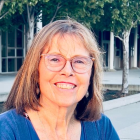These in-their-own-words pieces are told to Patricia Lane and co-edited with input from the interviewee for the purpose of brevity.
Emily Huddart Kennedy’s research shows everyone cares about the environment. The University of British Columbia professor’s recent book Eco-Types helps us understand five ways of relating to the natural world and invites us to approach each other from a place of compassion and respect.
Tell us about the book.
Based on personal interviews with 63 people from all walks of life and a large survey, I compare the strength of connection people feel to nature, the degree to which they think we face catastrophic breakdown, how strong a moral imperative they feel to act, and whether they think they can effect change. The results reveal everyone has a caring relationship to the natural world.
There are some striking similarities between people who allowed me to group people into five kinds of connection. Those I call “Eco Engaged” experience a fragile planet in need of protection from human destruction and disregard. They believe strongly that, as individuals, we all have a moral obligation to make environmentally friendly choices and this matters. Those I named “Self Effacing” share this concern, and admire the “Eco Engaged” but doubt their own efficacy. “Optimists” believe they live on a planet that is so strong and resilient that humans are largely inconsequential. “Fatalists” worry about environmental degradation and are angry with what they perceive to be corporate abuse of the natural world, but they don’t trust government or business to do what is needed. They see individual efforts, even done collectively, as insignificant in light of this power. Finally, the “Indifferent” love the natural world but don’t see it as their task to be informed or to act to protect it.
In the book, I invite the reader to step into the shoes of people in each category. Much of our attitudes are shaped by our past upbringing and our present social groups. I view those who express contempt for others who do care, but in ways we may not recognize as valid, as fuelling today’s polarized debates. If we are to keep our planet habitable, we need civil society to be united. This is entirely possible even if we love Earth differently.
In the 1970s, despite these differences, very significant legislation was passed reflecting a societal consensus in favour of conservation and love of the natural world. We haven’t changed our relationship to the environment, but we have changed what we think others feel.
My research revealed that more societal status is accorded to the Eco Engaged and Self Effacing than to the Optimists. Those at the top of the hierarchy are too often smug and dismissive, leaving Optimists resentful and angry. The climate crisis requires that we find a way to listen to everyone. If we can learn to do this with other “eco-types,” perhaps we can also break down hierarchies formed around issues like race, gender, sexual identity, immigration status and economic inequity.
How did you get interested in this idea?
I was raised on the West Coast and have always felt a sense of wonder at the beauty of the natural world around me.
I studied forest conservation at UBC and volunteered with environmental advocacy groups. In the school year, I was immersed in a culture that disparaged forest workers for perceived ignorance and selfishness. But I spent summers working with forest workers who had a deep love for nature but felt disparaged by urban environmentalists, whom they held in contempt for assuming they understood what actually happens in forests and for appearing to care more about trees than people. I could see both groups shared my love for the natural world but could only see each other as enemies. I wanted to play a part in building a bridge both could walk across.

What was hard about writing your book?
Political conservatives had doubts that anyone from a university would actually listen respectfully, so it was tough getting them to talk. Sometimes, when they were telling me things that were scientifically inaccurate, I had trouble staying curious. But I reminded myself that it was an act of courage and care for them to talk to me at all. Similarly, when eco-engaged people cast aspersions on conservative eco-types, I had to bite my tongue.
What do you see if we get this right?
Civil society will be in a better position to act as a force for ambitious environmental protection policy.
What would you like to say to other young people?
Things can and do change. People are working in every part of the world and in every part of our society to make things better. You will find more hope and inspiration by engaging with them than by distracting yourself, giving up or diving into the worst forecasts of doom. Ask your teachers and mentors to talk of solutions that are being implemented all around us but can be hard to see if you don’t know where to look.
What about older readers?
I have so much admiration for the older people who are working to protect the next generation. There is a powerful alliance building between the young and the old.







Comments
I'd like to point out that what one loves, one looks after, one way or another.
Those who "enjoy" what "nature" has to offer, but do nothing to look after it/protect it, are exploiting it for the pleasure it gives them. They don't actively *love* it.
Perhaps all those people need is a bit of education: but the climate deniers, and the "nothing done by littlle-ol'-me makes any difference" are just operating from a fact-free basis.
It's not that they don't deserve "compassion." But what they do with nature just is not loving it.
To love is a verb, not a sentiment.